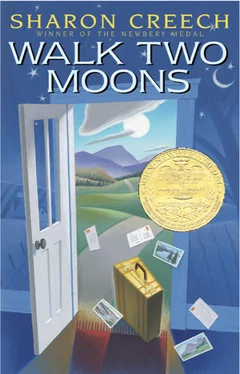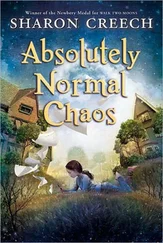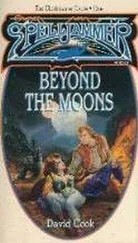Most of the time, my mother seemed nothing like her parents at all, and it was hard for me to imagine that she had come from them. But occasionally, in small, unexpected moments, the corners of my mother’s mouth would turn down and she’d say, “Really? Is that so?” and sound exactly like a Pickford.
4
THAT’S WHAT I’M TELLING YOU
On the day that Phoebe sat next to me at lunch and told me I was brave, she invited me to her house for dinner. To be honest, I was relieved that I would not have to eat at Margaret’s again. I did not want to see Dad and Margaret smiling at each other.
I wanted everything to be like it was. I wanted to be back in Bybanks, Kentucky, in the hills and the trees, near the cows and chickens and pigs. I wanted to run down the hill from the barn and through the kitchen door that banged behind me and see my mother and my father sitting at the table peeling apples.
Phoebe and I walked home from school together. We stopped briefly at my house so that I could call my father at work. Margaret had helped him find a job selling farm machinery. He said it made him happy as a clam at high water to know I had a new friend. Maybe this is really why he was happy, I thought, or maybe it was because he could be alone with Margaret Cadaver.
Phoebe and I then walked to her house. As we passed Margaret Cadaver’s house, a voice called out. “Sal? Sal? Is that you?”
In the shadows on the porch, Margaret’s mother, Mrs. Partridge, sat in a wicker rocker. A thick, gnarled cane with a handle carved in the shape of a cobra’s head lay across her knees. Her purple dress had slipped up over her bony knees, which were spread apart, and I hate to say it, but you could see right up her skirt. Around her neck was a yellow feather scarf. (“My boa,” she once told me, “my most favoritest boa.”)
As I started up the walk, Phoebe pulled on my arm. “Don’t go up there,” she said.
“It’s only Mrs. Partridge,” I said. “Come on.”
“Who’s that with you?” Mrs. Partridge said. “What’s that on her face?” I knew what she was going to do. She did this with me the first time I met her.
Phoebe placed her hands on her own round face and felt about.
“Come here,” Mrs. Partridge said. She wriggled her crooked little fingers at Phoebe.
Mrs. Partridge put her fingers up to Phoebe’s face and mashed around gently over her eyelids and down her cheeks. “Just as I thought. It’s two eyes, a nose, and a mouth.” Mrs. Partridge laughed a wicked laugh that sounded as if it were bouncing off jagged rocks. “You’re thirteen years old.”
“Yes,” Phoebe said.
“I knew it,” Mrs. Partridge said. “I just knew it.” She patted her yellow feather boa.
“This is Phoebe Winterbottom,” I said. “She lives right next door to you.”
When we left, Phoebe whispered, “I wish you hadn’t done that. I wish you hadn’t told her I lived next door.”
“Why not? You don’t seem to know Mrs. Cadaver and Mrs. Partridge very well—”
“They haven’t lived there very long. Only a month or so.”
“Don’t you think it’s remarkable that she guessed your age?”
“I don’t see what is so remarkable about it.” Before I could explain, Phoebe started telling me about the time that she and her mother, father, and sister, Prudence, had gone to the State Fair. At one booth, a crowd was gathered around a tall, thin man.
“So what was he doing?” I asked.
“That’s what I’m telling you,” Phoebe said. Phoebe had a way of sounding like a grown-up sometimes. When she said, “That’s what I’m telling you,” she sounded like a grown-up talking to a child. “What he was doing was guessing people’s ages. All around, people were saying, ‘Oh!’ and ‘Amazing!’ and ‘How does he do that?’ He had to guess your correct age within one year or else you won a teddy bear.”
“How did he do it?” I asked.
“That’s what I’m telling you,” Phoebe said. “The thin man would look someone over carefully, close his eyes, and then he would point his finger at the person and shout, ‘Seventy-two!’”
“At everyone? He guessed everyone to be seventy-two?”
“Sal,” she said. “That’s what I am trying to tell you. I was just giving an example. He might have said ‘ten’ or ‘thirty’ or—‘seventy-two.’ It just depended on the person. He was astounding.”
I really thought it was more astounding that Mrs. Partridge could do this, but I didn’t say anything.
Phoebe’s father wanted the thin man to guess his age. “My father thinks he looks very young, and he was certain he could fool the man. After studying my father, the thin man closed his eyes, pointed his finger at my father and shouted, ‘Fifty-two!’ My father gave a little yelp, and all around people were automatically saying, ‘Oh!’ and ‘Amazing’ and all that. But my father stopped them.”
“Why?”
Phoebe pulled on one of her yellow curls. I think she wished she hadn’t started this story in the first place. “Because he wasn’t anywhere near fifty-two. He was only thirty-eight.”
“Oh.”
“And all day long, my father followed us through the fair, carrying his prize, a large, green teddy bear. He was miserable. He kept saying, ‘Fifty-two? Fifty-two? Do I look fifty-two?’”
“Does he?” I said.
Phoebe pulled harder on her hair. “No, he does not look fifty-two. He looks thirty-eight.” She was very defensive about her father.
Phoebe’s mother was in the kitchen. “I’m making blackberry pie,” Mrs. Winterbottom said. “I hope you like blackberries—is there something wrong? Really, if you don’t like blackberries, I could—”
“No,” I said. “I like blackberries very much. I just have some allergies, I think.”
“To blackberries?” Mrs. Winterbottom said.
“No, not to blackberries.” The truth is, I do not have allergies, but I could not admit that blackberries reminded me of my mother.
Mrs. Winterbottom made me and Phoebe sit down at the kitchen table and tell her about our day. Phoebe told her about Mrs. Partridge guessing her age.
“She’s really remarkable,” I said.
Phoebe said, “It’s not that remarkable, Sal. I wouldn’t exactly use the word remarkable .”
“But Phoebe,” I said. “Mrs. Partridge is blind.”
Both Phoebe and her mother said, “Blind?”
Later, Phoebe said to me, “Don’t you think it’s odd that Mrs. Partridge, who is blind, could see something about me—but I, who can see, was blind about her? And speaking of odd, there’s something very odd about that Mrs. Cadaver.”
“Margaret?” I said.
“She scares me half to death,” Phoebe said.
“Why?”
“That’s what I’m telling you,” she said. “First, there is that name: Cadaver. You know what cadaver means?”
Actually, I did not.
“It means dead body. ”
“Are you sure?” I said.
“Of course I’m sure, Sal. You can check the dictionary if you want. Do you know what she does for a living—what her job is?”
“Yes,” I was pleased to say. I was pleased to know something . “She’s a nurse.”
“Exactly,” Phoebe said. “Would you want a nurse whose name meant dead body ? And that hair—don’t you think all that sticking-out red hair is spooky ? And that voice—it reminds me of dead leaves all blowing around on the ground.”
This was Phoebe’s power. In her world, no one was ordinary. People were either perfect—like her father—or, more often, they were lunatics or axe murderers. She could convince me of just about anything—especially about Margaret Cadaver. From that day on, Margaret Cadaver’s hair did look spooky and her voice did sound exactly like dead leaves. Somehow it was easier to deal with Margaret if there were reasons not to like her, and I definitely did not want to like her.
Читать дальше












